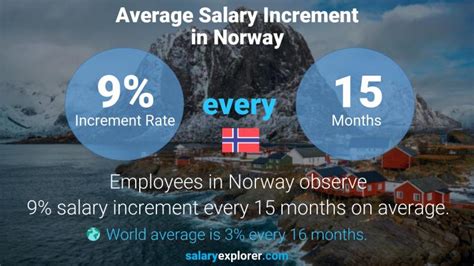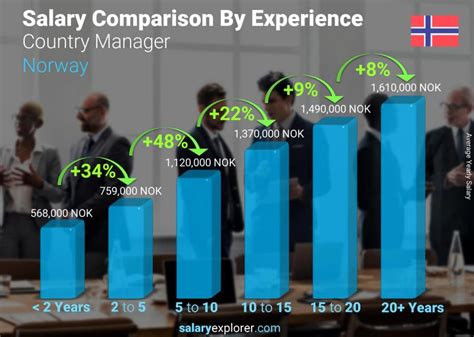Considering a career move to Norway? Known for its stunning natural landscapes, high quality of life, and progressive social policies, Norway also boasts one of the world's most robust and high-paying economies. For international professionals and local job seekers alike, understanding the earning potential is a critical step in planning a successful career path.
So, what can you expect to earn? While salaries vary significantly, the average monthly income in Norway is approximately 56,700 Norwegian Kroner (NOK), or about $5,400 USD, before tax. This figure positions Norway as one of the top-earning countries globally, but it’s just the beginning of the story. This in-depth guide will break down the numbers, explore the key factors that influence your salary, and provide a look at the job outlook in this dynamic Scandinavian nation.
Understanding the Norwegian Job Market

Before diving into the numbers, it's essential to understand the context of Norway's unique economic structure. Unlike many countries, Norway's labor market is heavily influenced by collective agreements (tariffsavtaler). These agreements, negotiated between trade unions and employer associations, set standardized wages and working conditions for a majority of industries.
This results in a relatively compressed salary structure, meaning the gap between the highest and lowest earners is smaller than in countries like the US or UK. While this can mean lower top-end executive salaries, it also ensures strong, livable wages for most workers, excellent benefits, and a focus on work-life balance. Remember to also factor in Norway's high cost of living, particularly in major cities, when evaluating salary figures.
Average Salary in Norway: The Numbers

According to the most recent data from Statistics Norway (SSB), the country's official statistics bureau, the average monthly salary for all sectors was 56,700 NOK as of late 2023.
However, an average can be skewed by a small number of very high earners. A more representative figure is often the median salary, which SSB reports as 51,810 NOK per month. This means half of all wage earners in Norway make more than this amount, and half make less.
To provide a clearer picture, here’s a typical salary range you might encounter:
- Entry-Level/Lower-Skilled Positions: 35,000 - 45,000 NOK per month
- Mid-Career Professionals (with degree): 50,000 - 70,000 NOK per month
- Senior/Highly Specialized Roles: 75,000 - 100,000+ NOK per month
*(Source: Statistics Norway (SSB), with range estimates supplemented by data from SalaryExpert and ERI Economic Research Institute.)*
Key Factors That Influence Salary

Your individual earning potential will depend on a combination of critical factors. Understanding these will help you negotiate your salary and plan your career trajectory effectively.
### Years of Experience
Experience is a primary driver of salary growth in Norway. While entry-level salaries are generous, seasoned professionals with a proven track record command significantly higher pay.
- Entry-Level (0-2 years): Typically start at or near the baseline salary for their field, as often defined by collective agreements.
- Mid-Career (5-10 years): Professionals can expect a 25-40% increase over their starting salary as they develop specialized skills and take on more responsibility.
- Senior/Executive (15+ years): Senior experts, managers, and executives are at the top of the pay scale. Their salaries are often less constrained by collective agreements and more dependent on performance and the company's success.
### Level of Education
Higher education directly correlates with higher earning potential in Norway. Data from SSB consistently shows that individuals with advanced degrees earn more over their lifetimes.
- No Higher Education: Workers in this category have the lowest average earnings.
- Bachelor's Degree: This is often the minimum requirement for many professional roles and provides a significant salary advantage over those without a degree.
- Master's Degree/PhD: Holding an advanced degree, particularly in a technical or specialized field, places you in the upper tier of earners. For example, an engineer with a Master's degree will command a much higher starting salary than one with a Bachelor's.
### Geographic Location
Where you work in Norway plays a major role in your salary, largely due to the varying cost of living.
- Oslo: As the capital and largest economic hub, Oslo offers the highest average salaries in the country. However, it also has the highest cost of living, especially for housing.
- Bergen and Trondheim: These major cities also offer competitive salaries, particularly in the tech, research, and maritime sectors, though slightly lower than in Oslo.
- Stavanger: Traditionally the heart of Norway's oil and gas industry, this region offers some of the highest salaries in the country, especially for engineers and technical specialists.
- Rural Areas: Salaries in smaller towns and rural regions are generally lower, but this is often balanced by a significantly lower cost of living.
### Industry and Specialization
Your chosen industry is arguably the most significant factor determining your salary. High-demand, high-value sectors offer the most lucrative opportunities.
- Top-Paying Industries:
- Mining and Quarrying (Oil & Gas): Historically the highest-paying sector in Norway.
- Financial and Insurance Services: Banking, investment, and insurance roles command very high salaries.
- Information & Communication (Tech): Software developers, data scientists, and cybersecurity experts are in high demand and well-compensated.
- Scientific and Technical Professions: Includes engineers, researchers, and legal professionals.
- Lower-Paying Industries:
- Accommodation and Food Services: Hospitality roles typically fall on the lower end of the pay scale.
- Retail: Jobs in retail trade generally offer salaries below the national average.
*(Source: Statistics Norway (SSB) provides detailed salary statistics broken down by industry.)*
Job Outlook and In-Demand Professions

The job outlook in Norway is strong and stable, with a consistently low unemployment rate. The Norwegian Labour and Welfare Administration (NAV) predicts continued demand for skilled labor, especially in sectors critical to the country's future.
Key growth areas include:
1. Technology: Norway is undergoing a rapid digital transformation, creating a high demand for IT specialists, software engineers, data analysts, and UX/UI designers.
2. Green Energy and Sustainability: As a global leader in sustainability, Norway is heavily investing in renewable energy, cleantech, and the "green shift." This has created a surge in jobs for environmental engineers, sustainability consultants, and specialists in wind and solar power.
3. Healthcare: Like many developed nations, Norway has a growing need for healthcare professionals, including nurses, specialist doctors, and psychologists.
4. Aquaculture: The "blue economy," particularly fish farming and seafood technology, is a major export industry with continuous demand for biologists, technicians, and engineers.
Conclusion: Is a Career in Norway Right for You?

Working in Norway offers more than just a high salary; it provides an opportunity to be part of a prosperous, stable, and forward-thinking society.
Key Takeaways:
- High Earning Potential: With an average monthly salary around 56,700 NOK, Norway is one of the world's top-paying countries.
- Salary is Contextual: High wages are balanced by a high cost of living and a progressive tax system that funds robust social services.
- Your Background Matters: Your industry, experience, education, and location will be the primary drivers of your specific salary.
- Strong Future Outlook: The demand for skilled professionals, particularly in tech, green energy, and healthcare, is expected to remain strong for years to come.
For professionals seeking a career that combines competitive financial rewards with an exceptional work-life balance and a strong social safety net, Norway presents an incredibly compelling opportunity. By understanding these salary dynamics, you can better position yourself for a successful and fulfilling career in the heart of Scandinavia.
